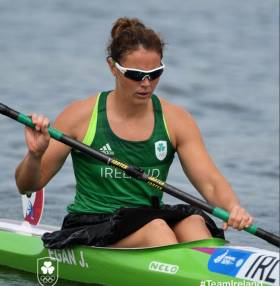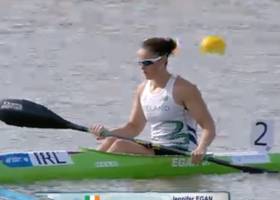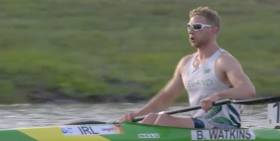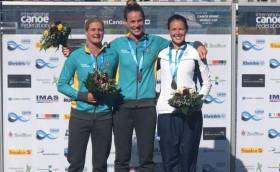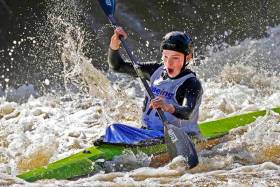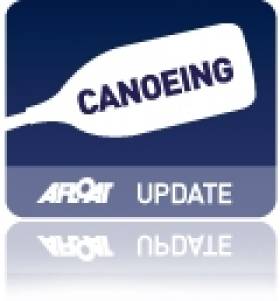Displaying items by tag: Barry Watkins
Young Guns Foley and Thomsen Win at 60th Liffey Descent [UPDATE]
#Canoeing: Ronan Foley (19) and Nikolai Thomsen (18) of Denmark were the fastest home as the Liffey Descent celebrated its 60th birthday today. The 32-kilometre test, with 10 weirs and a portage on the journey from Straffan to the Garda Boat Club in Islandbridge, sometimes rewards experienced competitors, but this was an exception. Both young men were competing for the first time in a K2 (double kayak) on this course, but they took advantage of the fast conditons to win a battle with experienced hands Barry Watkins and Neil Fleming. Foley and Thomsen moved in the final 1,000 metres to win in one hour 46 minutes and 40 seconds. Watkins and Fleming came home in 1:46.49.
The entry of 472 boats was blessed with a beautiful day, and there were some excellent peformances. Jenny Egan continued her record of wins in the mixed K2; she and fiance Jon Simmons were fourth at Lucan weir and fifth overall in a new best time for this boat. Malcolm Banks in the men's over 49 K1, also placed high in the overall rankings, while Peter Egan won the men's K1 on his first attempt at the class.
Liffey Descent 2019, Detailed Results (selected)
K2 – Men’s: 1 Ronan Foley (Salmon Leap CC)/Nikolai Thomsen (Denmark) 1:46.40, 2 Neil Fleming (Celbridge Paddlers)/ Barry Watkins (Salmon Leap CC) 1:46.49, 3 Sebastien Fergauven/Sebastien Jocano (Argentina) 1:47.16. Men’s O39: 1 Simon van Lonkhuyzen/Gary Mawer (Salmon Leap CC) 1:55.59, 2 David Francis/Declan Halton (Salmon Leap CC) 1:59.28, 3 Lutz Erichsen/Peter M. Jensen (Denmark) 2:04.09.
Mixed: 1 Jonathan Simmons/Jenny Egan (Salmon Leap CC) 1:51.52, 2 Deaglan O Drisceoil/Aisling Smith (Salmon Leap CC) 1:57.58, 3 Nicky Cresser/Alison Chmiel (Nottingham CC) 2:07.20.
K1 – Senior Men: 1 Peter Egan (Salmon Leap) 1:57.43, 2 Donnacha Brennan (Thomastown CC) 2:00.22, 3 Odhran McNally (Salmon Leap CC) 2:01.33. O39 men: 1 Dermot Hudson (Salmon Leap CC) 1:59.36, 2 Stewart O’Regan (Salmon Leap CC) 2:04.12, 3 John Parker (Worcester CC) 2:13.19. O49: 1 Malcolm Banks (Salmon Leap CC) 2:02.50, 2 James Butler (Nottingham CC) 2:06.38, 3 Neil Blackman ( Royal Leamington Spa) 2:08.39. Junior men: Senan Forristal (Thomastown Paddlers) 2:01.04, 2 Matthew McCartney (Celbridge Paddlers) 2:08.077, 3 Alex O’Brien (Celbridge Paddlers) 2:20.15.
Senior women: 1 Margaret Farrell 2:56.23, 2 Sara Griffin 3:10.46, 3 Amy Walsh 3:21.38.Junior women: 1 Aoibhin Ni Broin (Galway CC) 2:39.23.
T2 – Sean Martin/Eddie Martin (Piragua Madrid/Richmond CC) 2:14.39, 2 Fergus Cooper/Morgan Cooper (Canoeing Ireland) 2:16.07, 3 Lar O’Brien/Michael O’Farrell (Kilcullen CC) 2:19.00.
Wildwater – Open: 1 Darragh Clarke (Wild Waater KC) 2:15.4, 2 Maggie Dilai (Nottingham KC) 2:17.49, 3 Alex Sheppy (Devizes CC) 2:26.26
K1 Class B – Men: 1 Colin Wong (Canoeing Ireland) 2:29.46, 2 Mark Redmond (Wild Water KC) 2:30.45, 3 Padraig Dunne Athy Rowing and CC) 2:37.25. O39: 1 Gerry Murphy (Canoeing Ireland) 2:32.12, 2 Edward Broekaart (Canoeing Ireland) 2:34.33, 3 Gary McClure (Belfast CC) 2:36.05 Junior men: 1 Cameron Bannatyne (Soar Valley) 2:18.33, 2 Ethan Dowling (Ribbontail Paddlers) 2:47.03, 3 Michael O’Herlihy (Wild Water KC) 2:48.18
K1 Class C: Men: 1 Craig Stratford (Virginia KC) 2:54.10, 2 Brian James (Cabra KC) 2:56.59, 3 Wojciech Szydlo (Silverbridge KC) 2:59.48. O39: 1 Terry Smith (Athy Rowing and CC) 2:37.10, 2 Andrew Redmond (Wild Water KC) 2:39.30 3 Dermot Forristal (Thomastown Paddlers) 2:39.44. Junior men: 1 Daniel Stratford (Virginia KC) 2:38.40, 2 Barry Stratford (Virginia KC) 2:41.29, 3 Alex Russell (Canoeing Ireland) 2:44.35.
Women: 1 Ciara Gurhy (Wild Water KC) 2:47.45, 2 Helen Flanagan (Share Centre) 2:55.53, 3 Yvonne Crosse (Phoenix KC) 3:04.21. O39: 1 Fiona Kelly (Wildwater KC) 2:49.50, 2 Yvonne Kelly Castleknock Community Collge KC) 2:50.38, 3 Mary Fitzgerald (Athy Rowing and CC) 2:58.27. Junior women: 1 Emma Fay (Ribbontail Paddlers) 3:14.20, 2 Rachel Alexander (Virginian KC) 3:20.04.
C1 – 1 Stephen Dunne (Mullingar CC) 3:11.16, 2 Andy Jeffers (Phoenix CC) 3:26.30, 3 Paul Magee (Canoeing Ireland) 4:05.55
C2 - 1 Ben Boland/Roger McClure (Kilkenny Aqua CC) 2:37.26, 2 Gearoid Jones/James Dillon (DIT CC) 2:47.54 3 Gerry Coonan/Gerry O’Brien (Wild Water KC) 3:00.42. C2 (mixed) – 1 Elaine Alexander/Richard Hobson (CANI/Lisburn City Paddlers) 2:57.58, 2 Colin Lively/Jacqui McVicar (Share Centre) 3:06.04, 3 Eamonn Dodd/Lynda Byron (Wild Water KC) 3:15.50.
C3 – 1 D Comerford/S O’Neill/S O’Neill (Thomastown Paddlers) 2:48.24, 2 Y Kalogerakis/ D Holden/B Comerford (Canoeing Ireland) 2:51.20, 3 K Durkan/S Durkan/M Fitzsimon (Celbridge Paddlers) 3:00.20.
Best Club (combined K1 and K2 times) : Salmon Leap Canoe Club, Leixlip
International Trophy: Ireland.
Liffey Descent Set for Busy Sixtieth Birthday
#Rowing: Jenny Egan and Jon Simmons of Salmon Leap Canoe Club defend their mixed K2 title at Saturday’s 60th anniversary Liffey Descent, which starts from Straffan at 12 o'clock and finishes 32 kilometres later at the Garda Boat Club in Islandbridge.
Egan is going for a third consecutive victory in this category - in 2017, she paired up with brother Peter to win in a course record time of 1 hour 55 minutes. Also competing in this category are Deaglan O Drisceoil and Aisling Smith of Salmon Leap, who finished second in the world renowned Sella Marathon in Spain earlier this summer. Both are previous K1 winners.
It will be an eleventh “Liffey” for Egan, who is attempting to win selection for the Tokyo Olympics and spent the summer competing at races around Europe.
Peter Egan, who finished second in men’s K2 last year, goes in K1 this year. Tadhg de Barra and Donnacha Brennan, both from Thomastown Paddlers, look like the other main contenders.
Barry Watkins, another Salmon Leap paddler, won his first K1 title last year, but reverts to K2 this time, where his partner is previous K1 winner Neil Fleming of Celbridge Paddlers. This could prove to be the most competitive class of the day with a number of strong Irish boats as well as at least four entries from the UK, two from Argentina, and one each from Spain, the Czech Republic and Germany.
Among the local entries, former European junior marathon champion Ronan Foley teams up with Nikolai Thomsen of Denmark for his first attempt at senior K2, while Michael Brennan, winner of the open canoe singles last year, takes to the water this time with his Thomastown club mate Anthony Forristal.
After a long dry summer, last year’s Liffey Descent was the driest on record which meant times were slow and fewer recreational boats entered. This year, low water won’t be a problem, thanks to plenty of rainfall in the past few months which means the ESB can release a small flood. Spectators on the banks of the Liffey may have good entertainment on Saturday. Premium spots are at the bridge in Straffan just down from the start and at Lucan weir.
C Final Place for Jenny Egan at World Championships
#Canoeing: Jenny Egan took eighth in her semi-final of the K1 500 metres and moved into the C Final at the canoe sprint World Championships in Szeged in Hungary today. The top three qualified for the A Final and stayed in contention for qualifying places for the Olympic Games.
Barry Watkins finished ninth in the B Final of the men’s K1 1,000 metres, 18th overall, while Egan had taken sixth in the C Final of the K1 200m, 24th overall.
Canoe Sprint World Championships, Szeged, Hungary
Men
K1 1,000m – B Final: 9 B Watkins 3:47.24
Women
K1 200m C Final: 6 J Egan 6:43.49
K1 500m Semi-Final Three (First Three to A Final; 4-6 to B Final; 7-9 to C Final): 8 Egan 2:00.01.
Watkins Takes Place in Second B Final at World Championships
#Canoeing: Barry Watkins qualified for the B Final of the men’s K1 1,000 metres at the canoe sprint World Championships in Szeged in Hungary. He finished sixth in his semi-final. He had earlier finished sixth in the B Final of the K1 500 metres (15th overall).
Jenny Egan qualified for Saturday’s semi-final of the K1 500 metres, taking fourth in her heat. This class is effectively the one remaining chance of Ireland qualifying a boat for the Olympic Games from the World Championships.
Egan took eighth in the semi-final of the K1 200m, slotting into the C Final for places 19 to 27.
Canoe Sprint World Championships, Szeged, Hungary, Day Three (Irish interest)
Men
K1 1,000m – Semi-Final (First Three to A Final; 4-6 to B Final; 7-9 to C Final): 6 B Watkins 3:30.89
K1 500m – B Final (places 10 to 18): 6 B Watkins 1 min 40.25 sec
Women
K1 200m – Semi-Final Three (First Three to A Final; 4-6 to B Final; 7-9 to C Final): 8 J Egan 41.03.
K1 500m – Heat Three: 4 Egan 1:53.54
Bronze for Jenny Egan at Duisburg World Cup
#Rowing: Jenny Egan had another podium finish at the canoe sprint World Cup today. Following a silver in Poznan last weekend, she took a bronze in Duisburg in her favourite event, the K1 5,000m. Two Australians took gold and silver. Ronan Foley was 15th in the men’s 5,000. Barry Watkins took sixth in the C Final of the men’s K1 1,000 and sixth in the B Final of the K1 500.
In other canoeing news, Matthew McCartney took bronze at junior level at the canoe marathon World Cup in Norway in two events: the K1 22.6 kilometre and the K1 3,400m.
Liam Jegou reached the final of the C1 at the canoe slalom European Championships in Pau, but missed out on the final.
Watkins and Egan Qualify for World Cup Semi-Finals
#Canoeing: Jenny Egan and Barry Watkins qualified for semi-finals at the canoe sprint World Cup in Poznan, Poland. Egan finished fifth in her heat of the K1 200m, while Watkins matched this in the men’s K1 1,000. The paracanoeist Patrick O’Leary reached the final of the VL3 by taking third in his semi-final.
Canoe Sprint World Cup, Poznan, Poland (Irish interest)
Men
K1 1000 – Heat Two: 8 Ronan Foley. Heat Five: 5 Barry Watkins
K1 200m – Heat Two: 5 Ryan O’Connor
Women
K1 200m – Heat Six: 5 Jenny Egan
Paracanoeing: VL3 Men’s 200m – Semi-Final One: 3 Patrick O’Leary. KL3 Semi-Final: 4 O’Leary
#Canoeing: Ronan Foley took gold medals on Saturday and Sunday at the canoe marathon World Cup in in Viana do Castelo in Portugal. The Kilcullen man dominated the short race on Saturday, and then sprinted away from his rivals on the last portage to win the marathon test on the Sunday.
Barry Watkins took silver in the senior race over the short course on Saturday and took 10th on Sunday – recovering from an unwanted swim in rough conditions.
Canoe Marathon World Cup, Viana Do Castelo, Portugal (Irish interest; selected results):
Saturday
Men – K1 Short Race: 2 B Watkins 13:46.15.
K1 Short Race, Juniors: 1 R Foley 14 min 52.43 sec.
Sunday
Men – K1 Marathon: 10 Watkins 2 hr 21 min 10.20.
K1 Marathon, Junior Final: 1 Foley 1 hr 53 min 7.34 sec.
Big Weekend for Ireland's Canoeists in Balkans
Eoin Rheinisch made a good start in the K1 qualification round at the Canoe Slalom World Cup in Slovenia.
The Kildare native - who is recovering from a shoulder operation - finished 10th in the heats, qualifying for yesterday's semi-finals where he finished in 28th place.
The Irish Times reports that he described the performance as encouraging.
“I enjoyed myself today and that was my goal,” he said.
In other action from Slovenia, Hannah Craig failed make the semi-final in the women’s K1, while Patrick Hynes and Ciaran Heurteau missed out in the men’s K1.
Meanwhile in Serbia, Salmon Leap's Jenny Egan set a new Irish women's record of 1m 55.9 sec in the 500m semis at the European Sprint Canoe Championships in Belgrade, the Evening Herald reports.
She went on to finish ninth in both the 5,000m final annd 200m B final.
Fellow Salmon Leap member Barry Watkins placed fourth in the 500m B final and eighth in the 1,000m B final.



























